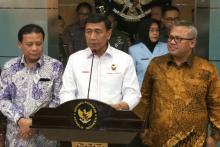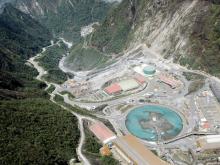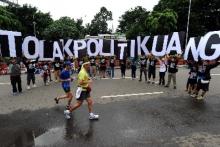Coordinating Minister for Political, Legal and Security Affairs Wiranto appealed to the Corruption Eradication Commission (KPK) to postpone the handling of cases involving candidates for regional heads in the period of regional heads elections (Pilkada). This appeal was conveyed after a meeting with the General Election Commission (KPU), Election Supervisory Board (Bawaslu), and the Election Ethics Board on Tuesday (13/03/2018) in Jakarta.
PT Freeport Indonesia (PTFI) was again called out for causing environmental damage and illegal use of protected forest. This time, the offenses were revealed as findings in a report published by the Audit Board of Indonesia (BPK) regarding the implementation of PTFI’s Contract of Work (CoW) for the period between 2013 and 2015.
In early March 2018, KPK announced the recruitment for the positions of law enforcement deputy and director of investigation. The former position was held by Insp. Gen. Heru Winarko, who has been installed as the new head of National Narcotics Agency (BNN), while the latter by Brig. Gen. Aris Budiman, who decided to return to the headquarters of the Indonesian national police.
Election is one of the ways to make leadership circulation running well. Otherwise, the government would potentially entering authoritarian government which tends to be corrupt. Election needs to be conducted in a democratic country, both at the national level (presidential election) as well as at the local level (regional election).
The House of Representatives (DPR) and the Government have finished discussing the revision of Law No. 17 of 2014 on the People’s Consultative Assembly (MPR), House of Representatives (DPR), Regional House of Representatives (DPRD) and the Regional Representatives Council (DPD), commonly known as the MD3 Law. However, the revision of the Law, passed on 12 February 2018, has introduced several new materials that result in a strong reaction from the public.
The plan of the House of Representatives (DPR) to pass the Criminal Code Bill (RKUHP) into a Law has created a polemic and resulted in vocal rejection by many. The existing substance of the Criminal Code Bill is considered as dangerous towards democracy, human rights enforcement and eradication of corruption in Indonesia.
On 8 February 2018, the Constitutional Court pronounced its ruling on the request for judicial review submitted by KPK employees, in question of the validity of the House of Representatives’ invocation of its inquiry rights pertaining to the KPK (Corruption Eradication Commission), herein after ‘KPK Inquiry’. With Decision No. 36/PUU-XV/2017, the Constitutional Court declared that the KPK Inquiry is valid. The Court rejected the argument of the plaintiff that the KPK Inquiry was in violation of Article 79 paragraph (3) of Law No. 17 of 2014 on the MPR, DPR, DPD and DPRD (MD3 Law).
Law No. 6 of 2014 on the Village obliges the central government to allocate the Village Funds from the national budget for the improvement of public services, community empowerment and rural development.
One of the specters haunting the conduct of “Feasts of Democracy” i.e. the political elections of Indonesia, both national and regional, is the practice of money politics. The terminology refers to the practice of buying votes by election participants as well as by supporters, whether official or not, usually conducted before a vote is held. Due to money politics, voters lose their autonomy to elect candidates for public officials through rational considerations, such as track records, performance, programs or campaign promises, and choose candidates merely for pecuniary gains.










